Palliative Care Framework: New Zealand
VerifiedAdded on 2023/03/31
|8
|1333
|250
AI Summary
This paper discusses the functioning of New Zealand's palliative care framework, including best practice trends, care aspects, and ethical and legal considerations. It emphasizes the importance of patient-centered, family-centered, and culturally competent practices in palliative care.
Contribute Materials
Your contribution can guide someone’s learning journey. Share your
documents today.
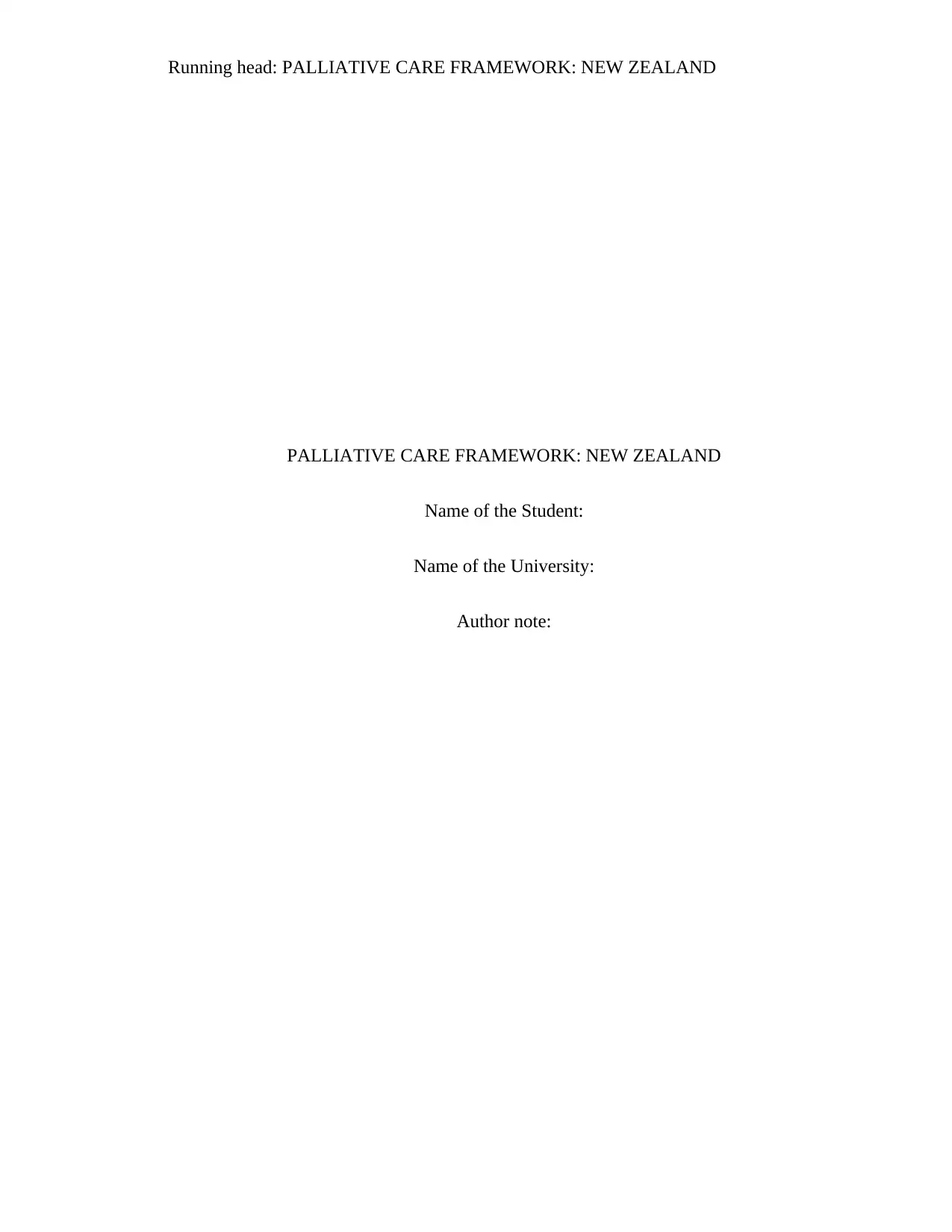
Running head: PALLIATIVE CARE FRAMEWORK: NEW ZEALAND
PALLIATIVE CARE FRAMEWORK: NEW ZEALAND
Name of the Student:
Name of the University:
Author note:
PALLIATIVE CARE FRAMEWORK: NEW ZEALAND
Name of the Student:
Name of the University:
Author note:
Secure Best Marks with AI Grader
Need help grading? Try our AI Grader for instant feedback on your assignments.
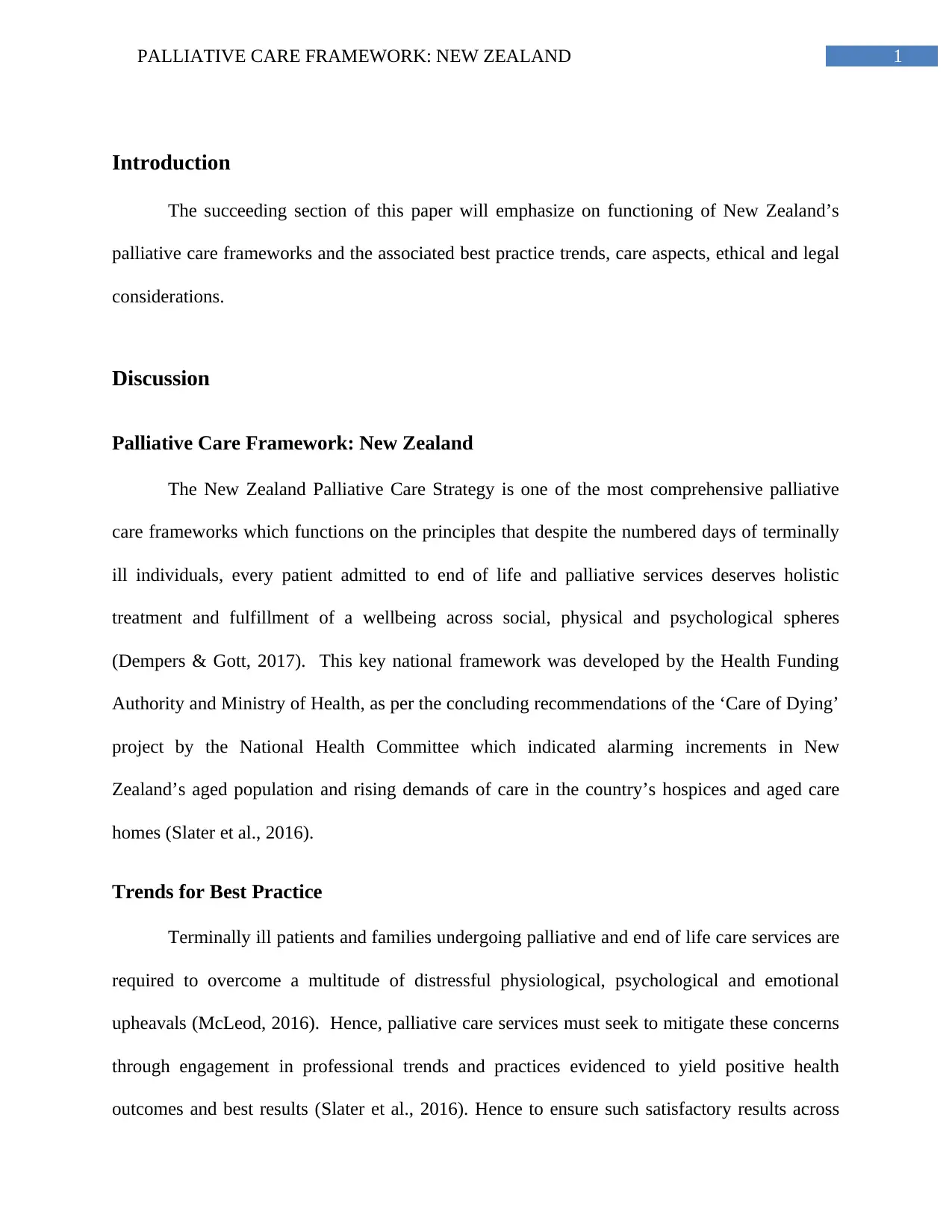
1PALLIATIVE CARE FRAMEWORK: NEW ZEALAND
Introduction
The succeeding section of this paper will emphasize on functioning of New Zealand’s
palliative care frameworks and the associated best practice trends, care aspects, ethical and legal
considerations.
Discussion
Palliative Care Framework: New Zealand
The New Zealand Palliative Care Strategy is one of the most comprehensive palliative
care frameworks which functions on the principles that despite the numbered days of terminally
ill individuals, every patient admitted to end of life and palliative services deserves holistic
treatment and fulfillment of a wellbeing across social, physical and psychological spheres
(Dempers & Gott, 2017). This key national framework was developed by the Health Funding
Authority and Ministry of Health, as per the concluding recommendations of the ‘Care of Dying’
project by the National Health Committee which indicated alarming increments in New
Zealand’s aged population and rising demands of care in the country’s hospices and aged care
homes (Slater et al., 2016).
Trends for Best Practice
Terminally ill patients and families undergoing palliative and end of life care services are
required to overcome a multitude of distressful physiological, psychological and emotional
upheavals (McLeod, 2016). Hence, palliative care services must seek to mitigate these concerns
through engagement in professional trends and practices evidenced to yield positive health
outcomes and best results (Slater et al., 2016). Hence to ensure such satisfactory results across
Introduction
The succeeding section of this paper will emphasize on functioning of New Zealand’s
palliative care frameworks and the associated best practice trends, care aspects, ethical and legal
considerations.
Discussion
Palliative Care Framework: New Zealand
The New Zealand Palliative Care Strategy is one of the most comprehensive palliative
care frameworks which functions on the principles that despite the numbered days of terminally
ill individuals, every patient admitted to end of life and palliative services deserves holistic
treatment and fulfillment of a wellbeing across social, physical and psychological spheres
(Dempers & Gott, 2017). This key national framework was developed by the Health Funding
Authority and Ministry of Health, as per the concluding recommendations of the ‘Care of Dying’
project by the National Health Committee which indicated alarming increments in New
Zealand’s aged population and rising demands of care in the country’s hospices and aged care
homes (Slater et al., 2016).
Trends for Best Practice
Terminally ill patients and families undergoing palliative and end of life care services are
required to overcome a multitude of distressful physiological, psychological and emotional
upheavals (McLeod, 2016). Hence, palliative care services must seek to mitigate these concerns
through engagement in professional trends and practices evidenced to yield positive health
outcomes and best results (Slater et al., 2016). Hence to ensure such satisfactory results across
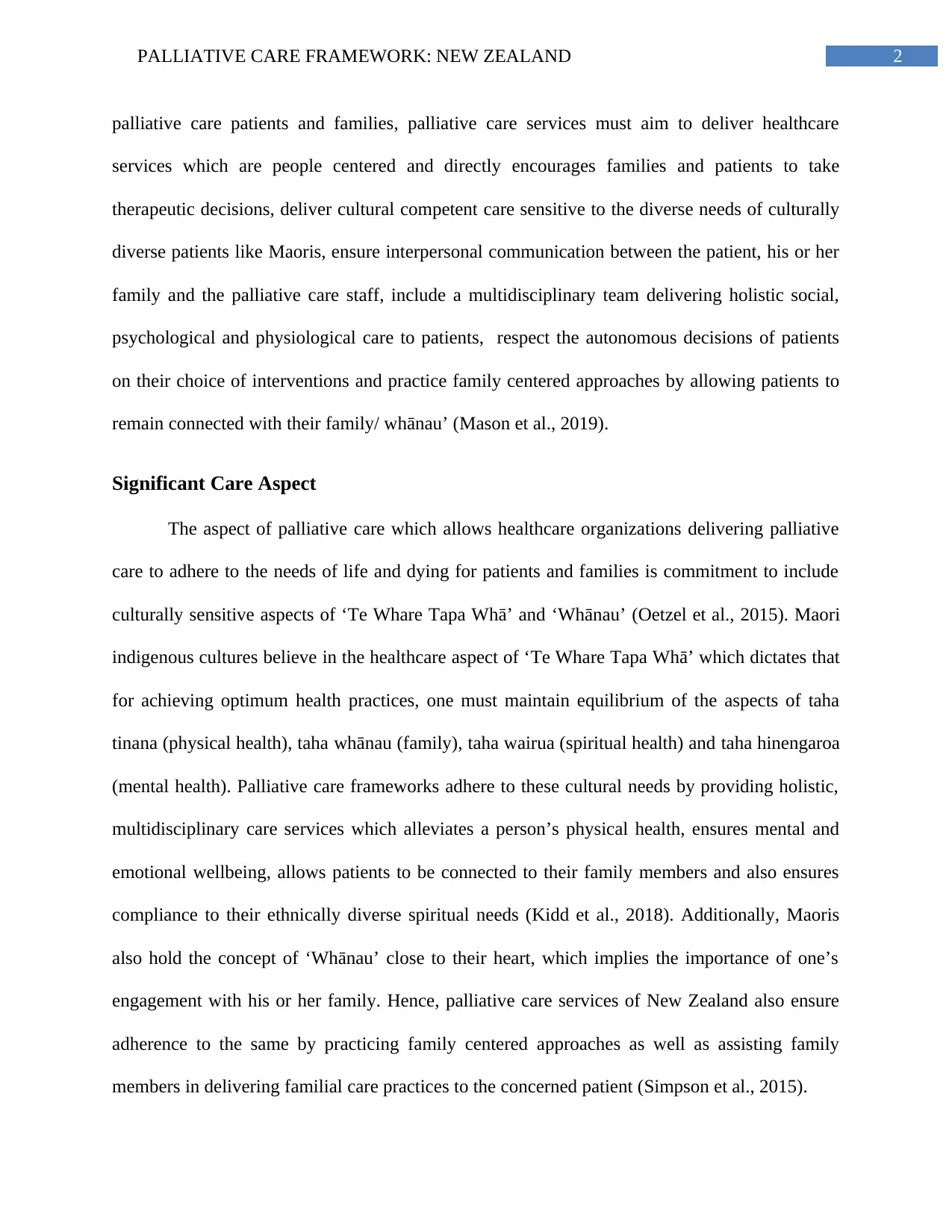
2PALLIATIVE CARE FRAMEWORK: NEW ZEALAND
palliative care patients and families, palliative care services must aim to deliver healthcare
services which are people centered and directly encourages families and patients to take
therapeutic decisions, deliver cultural competent care sensitive to the diverse needs of culturally
diverse patients like Maoris, ensure interpersonal communication between the patient, his or her
family and the palliative care staff, include a multidisciplinary team delivering holistic social,
psychological and physiological care to patients, respect the autonomous decisions of patients
on their choice of interventions and practice family centered approaches by allowing patients to
remain connected with their family/ whānau’ (Mason et al., 2019).
Significant Care Aspect
The aspect of palliative care which allows healthcare organizations delivering palliative
care to adhere to the needs of life and dying for patients and families is commitment to include
culturally sensitive aspects of ‘Te Whare Tapa Whā’ and ‘Whānau’ (Oetzel et al., 2015). Maori
indigenous cultures believe in the healthcare aspect of ‘Te Whare Tapa Whā’ which dictates that
for achieving optimum health practices, one must maintain equilibrium of the aspects of taha
tinana (physical health), taha whānau (family), taha wairua (spiritual health) and taha hinengaroa
(mental health). Palliative care frameworks adhere to these cultural needs by providing holistic,
multidisciplinary care services which alleviates a person’s physical health, ensures mental and
emotional wellbeing, allows patients to be connected to their family members and also ensures
compliance to their ethnically diverse spiritual needs (Kidd et al., 2018). Additionally, Maoris
also hold the concept of ‘Whānau’ close to their heart, which implies the importance of one’s
engagement with his or her family. Hence, palliative care services of New Zealand also ensure
adherence to the same by practicing family centered approaches as well as assisting family
members in delivering familial care practices to the concerned patient (Simpson et al., 2015).
palliative care patients and families, palliative care services must aim to deliver healthcare
services which are people centered and directly encourages families and patients to take
therapeutic decisions, deliver cultural competent care sensitive to the diverse needs of culturally
diverse patients like Maoris, ensure interpersonal communication between the patient, his or her
family and the palliative care staff, include a multidisciplinary team delivering holistic social,
psychological and physiological care to patients, respect the autonomous decisions of patients
on their choice of interventions and practice family centered approaches by allowing patients to
remain connected with their family/ whānau’ (Mason et al., 2019).
Significant Care Aspect
The aspect of palliative care which allows healthcare organizations delivering palliative
care to adhere to the needs of life and dying for patients and families is commitment to include
culturally sensitive aspects of ‘Te Whare Tapa Whā’ and ‘Whānau’ (Oetzel et al., 2015). Maori
indigenous cultures believe in the healthcare aspect of ‘Te Whare Tapa Whā’ which dictates that
for achieving optimum health practices, one must maintain equilibrium of the aspects of taha
tinana (physical health), taha whānau (family), taha wairua (spiritual health) and taha hinengaroa
(mental health). Palliative care frameworks adhere to these cultural needs by providing holistic,
multidisciplinary care services which alleviates a person’s physical health, ensures mental and
emotional wellbeing, allows patients to be connected to their family members and also ensures
compliance to their ethnically diverse spiritual needs (Kidd et al., 2018). Additionally, Maoris
also hold the concept of ‘Whānau’ close to their heart, which implies the importance of one’s
engagement with his or her family. Hence, palliative care services of New Zealand also ensure
adherence to the same by practicing family centered approaches as well as assisting family
members in delivering familial care practices to the concerned patient (Simpson et al., 2015).
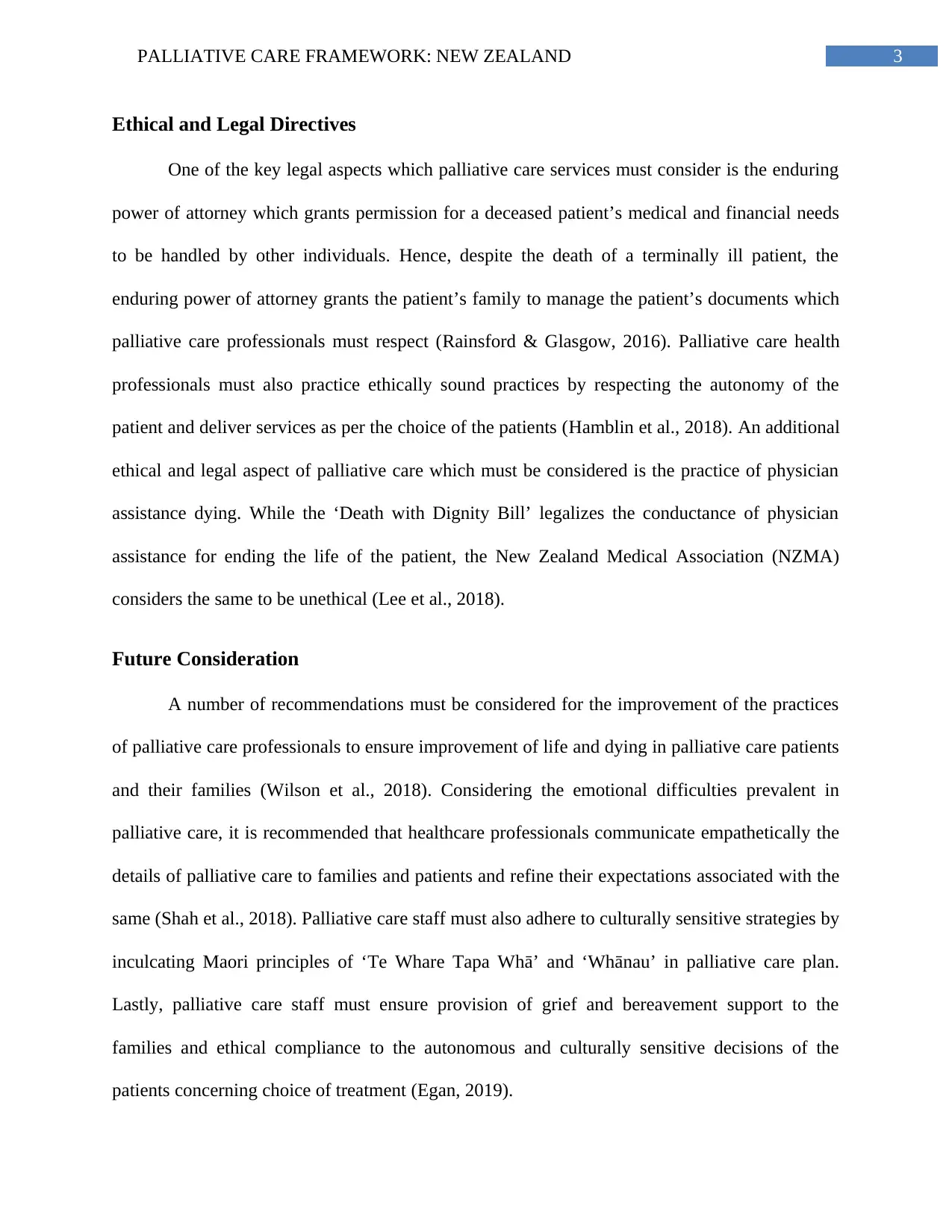
3PALLIATIVE CARE FRAMEWORK: NEW ZEALAND
Ethical and Legal Directives
One of the key legal aspects which palliative care services must consider is the enduring
power of attorney which grants permission for a deceased patient’s medical and financial needs
to be handled by other individuals. Hence, despite the death of a terminally ill patient, the
enduring power of attorney grants the patient’s family to manage the patient’s documents which
palliative care professionals must respect (Rainsford & Glasgow, 2016). Palliative care health
professionals must also practice ethically sound practices by respecting the autonomy of the
patient and deliver services as per the choice of the patients (Hamblin et al., 2018). An additional
ethical and legal aspect of palliative care which must be considered is the practice of physician
assistance dying. While the ‘Death with Dignity Bill’ legalizes the conductance of physician
assistance for ending the life of the patient, the New Zealand Medical Association (NZMA)
considers the same to be unethical (Lee et al., 2018).
Future Consideration
A number of recommendations must be considered for the improvement of the practices
of palliative care professionals to ensure improvement of life and dying in palliative care patients
and their families (Wilson et al., 2018). Considering the emotional difficulties prevalent in
palliative care, it is recommended that healthcare professionals communicate empathetically the
details of palliative care to families and patients and refine their expectations associated with the
same (Shah et al., 2018). Palliative care staff must also adhere to culturally sensitive strategies by
inculcating Maori principles of ‘Te Whare Tapa Whā’ and ‘Whānau’ in palliative care plan.
Lastly, palliative care staff must ensure provision of grief and bereavement support to the
families and ethical compliance to the autonomous and culturally sensitive decisions of the
patients concerning choice of treatment (Egan, 2019).
Ethical and Legal Directives
One of the key legal aspects which palliative care services must consider is the enduring
power of attorney which grants permission for a deceased patient’s medical and financial needs
to be handled by other individuals. Hence, despite the death of a terminally ill patient, the
enduring power of attorney grants the patient’s family to manage the patient’s documents which
palliative care professionals must respect (Rainsford & Glasgow, 2016). Palliative care health
professionals must also practice ethically sound practices by respecting the autonomy of the
patient and deliver services as per the choice of the patients (Hamblin et al., 2018). An additional
ethical and legal aspect of palliative care which must be considered is the practice of physician
assistance dying. While the ‘Death with Dignity Bill’ legalizes the conductance of physician
assistance for ending the life of the patient, the New Zealand Medical Association (NZMA)
considers the same to be unethical (Lee et al., 2018).
Future Consideration
A number of recommendations must be considered for the improvement of the practices
of palliative care professionals to ensure improvement of life and dying in palliative care patients
and their families (Wilson et al., 2018). Considering the emotional difficulties prevalent in
palliative care, it is recommended that healthcare professionals communicate empathetically the
details of palliative care to families and patients and refine their expectations associated with the
same (Shah et al., 2018). Palliative care staff must also adhere to culturally sensitive strategies by
inculcating Maori principles of ‘Te Whare Tapa Whā’ and ‘Whānau’ in palliative care plan.
Lastly, palliative care staff must ensure provision of grief and bereavement support to the
families and ethical compliance to the autonomous and culturally sensitive decisions of the
patients concerning choice of treatment (Egan, 2019).
Secure Best Marks with AI Grader
Need help grading? Try our AI Grader for instant feedback on your assignments.
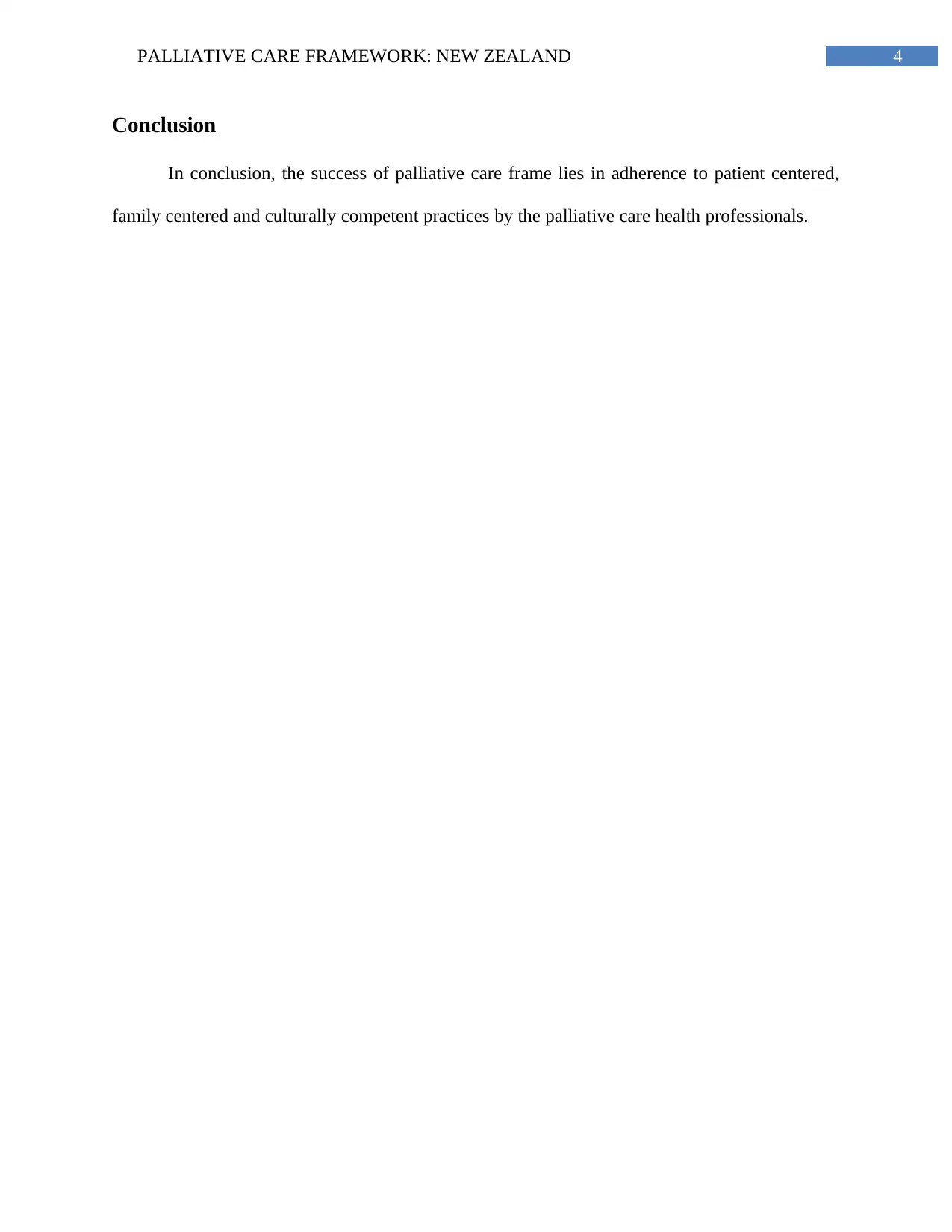
4PALLIATIVE CARE FRAMEWORK: NEW ZEALAND
Conclusion
In conclusion, the success of palliative care frame lies in adherence to patient centered,
family centered and culturally competent practices by the palliative care health professionals.
Conclusion
In conclusion, the success of palliative care frame lies in adherence to patient centered,
family centered and culturally competent practices by the palliative care health professionals.
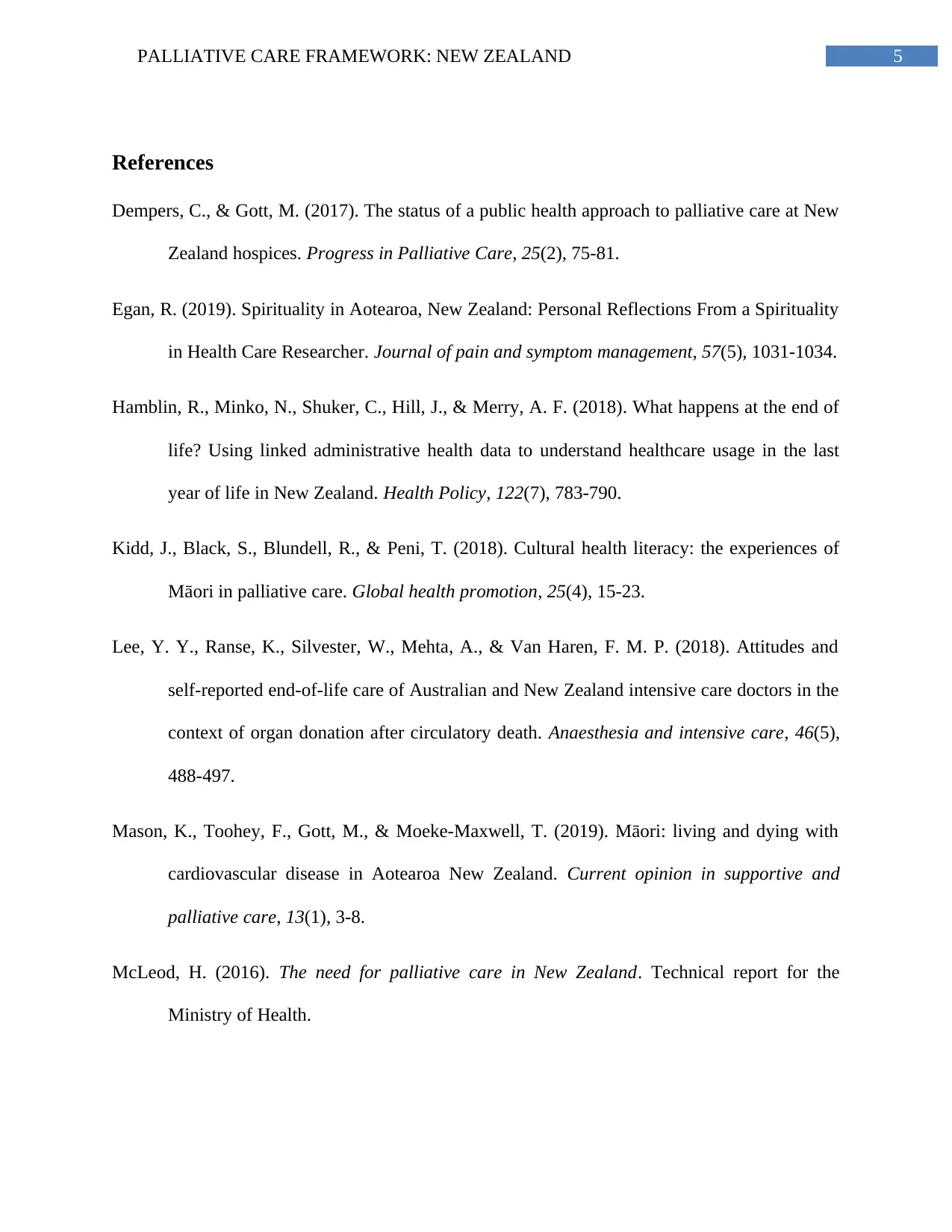
5PALLIATIVE CARE FRAMEWORK: NEW ZEALAND
References
Dempers, C., & Gott, M. (2017). The status of a public health approach to palliative care at New
Zealand hospices. Progress in Palliative Care, 25(2), 75-81.
Egan, R. (2019). Spirituality in Aotearoa, New Zealand: Personal Reflections From a Spirituality
in Health Care Researcher. Journal of pain and symptom management, 57(5), 1031-1034.
Hamblin, R., Minko, N., Shuker, C., Hill, J., & Merry, A. F. (2018). What happens at the end of
life? Using linked administrative health data to understand healthcare usage in the last
year of life in New Zealand. Health Policy, 122(7), 783-790.
Kidd, J., Black, S., Blundell, R., & Peni, T. (2018). Cultural health literacy: the experiences of
Māori in palliative care. Global health promotion, 25(4), 15-23.
Lee, Y. Y., Ranse, K., Silvester, W., Mehta, A., & Van Haren, F. M. P. (2018). Attitudes and
self-reported end-of-life care of Australian and New Zealand intensive care doctors in the
context of organ donation after circulatory death. Anaesthesia and intensive care, 46(5),
488-497.
Mason, K., Toohey, F., Gott, M., & Moeke-Maxwell, T. (2019). Māori: living and dying with
cardiovascular disease in Aotearoa New Zealand. Current opinion in supportive and
palliative care, 13(1), 3-8.
McLeod, H. (2016). The need for palliative care in New Zealand. Technical report for the
Ministry of Health.
References
Dempers, C., & Gott, M. (2017). The status of a public health approach to palliative care at New
Zealand hospices. Progress in Palliative Care, 25(2), 75-81.
Egan, R. (2019). Spirituality in Aotearoa, New Zealand: Personal Reflections From a Spirituality
in Health Care Researcher. Journal of pain and symptom management, 57(5), 1031-1034.
Hamblin, R., Minko, N., Shuker, C., Hill, J., & Merry, A. F. (2018). What happens at the end of
life? Using linked administrative health data to understand healthcare usage in the last
year of life in New Zealand. Health Policy, 122(7), 783-790.
Kidd, J., Black, S., Blundell, R., & Peni, T. (2018). Cultural health literacy: the experiences of
Māori in palliative care. Global health promotion, 25(4), 15-23.
Lee, Y. Y., Ranse, K., Silvester, W., Mehta, A., & Van Haren, F. M. P. (2018). Attitudes and
self-reported end-of-life care of Australian and New Zealand intensive care doctors in the
context of organ donation after circulatory death. Anaesthesia and intensive care, 46(5),
488-497.
Mason, K., Toohey, F., Gott, M., & Moeke-Maxwell, T. (2019). Māori: living and dying with
cardiovascular disease in Aotearoa New Zealand. Current opinion in supportive and
palliative care, 13(1), 3-8.
McLeod, H. (2016). The need for palliative care in New Zealand. Technical report for the
Ministry of Health.
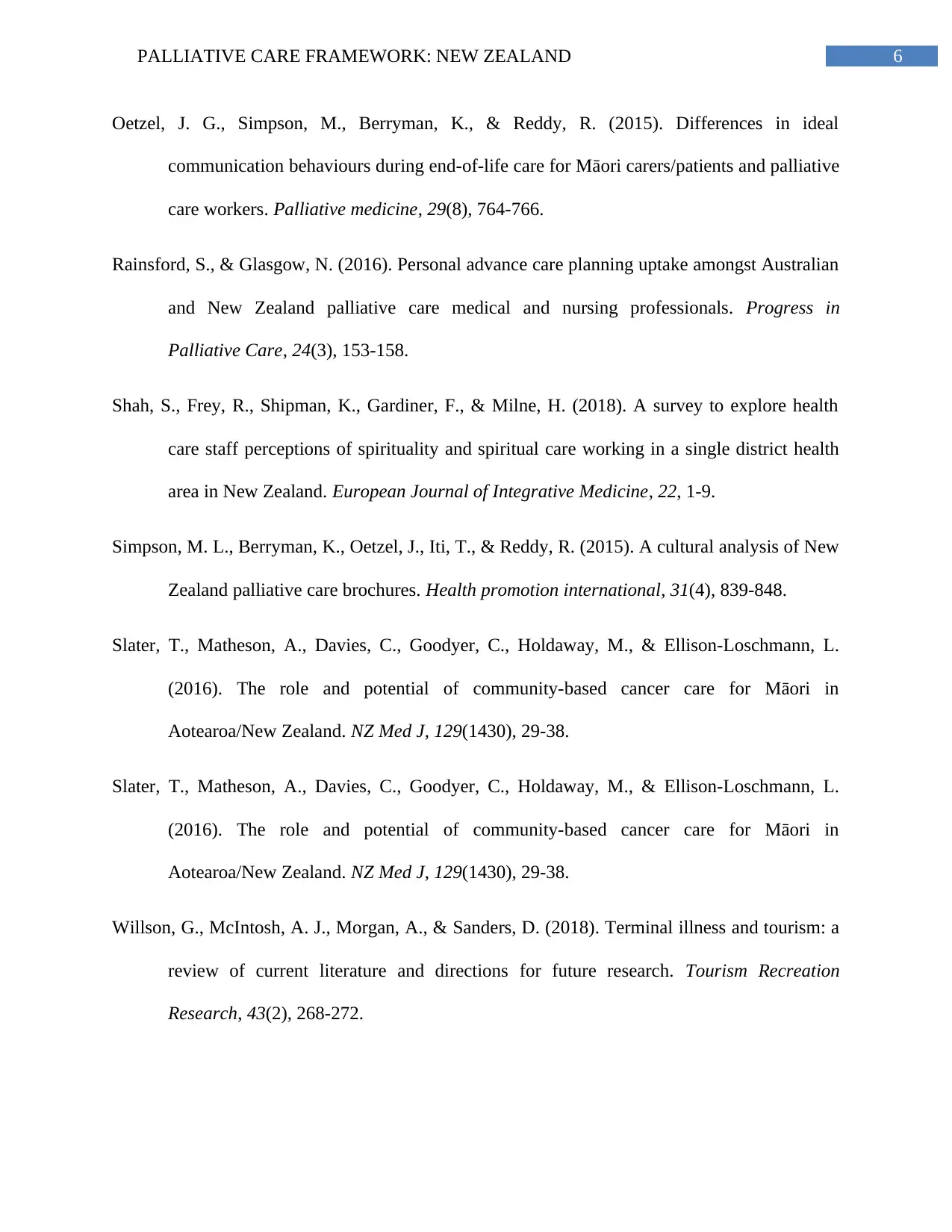
6PALLIATIVE CARE FRAMEWORK: NEW ZEALAND
Oetzel, J. G., Simpson, M., Berryman, K., & Reddy, R. (2015). Differences in ideal
communication behaviours during end-of-life care for Māori carers/patients and palliative
care workers. Palliative medicine, 29(8), 764-766.
Rainsford, S., & Glasgow, N. (2016). Personal advance care planning uptake amongst Australian
and New Zealand palliative care medical and nursing professionals. Progress in
Palliative Care, 24(3), 153-158.
Shah, S., Frey, R., Shipman, K., Gardiner, F., & Milne, H. (2018). A survey to explore health
care staff perceptions of spirituality and spiritual care working in a single district health
area in New Zealand. European Journal of Integrative Medicine, 22, 1-9.
Simpson, M. L., Berryman, K., Oetzel, J., Iti, T., & Reddy, R. (2015). A cultural analysis of New
Zealand palliative care brochures. Health promotion international, 31(4), 839-848.
Slater, T., Matheson, A., Davies, C., Goodyer, C., Holdaway, M., & Ellison-Loschmann, L.
(2016). The role and potential of community-based cancer care for Māori in
Aotearoa/New Zealand. NZ Med J, 129(1430), 29-38.
Slater, T., Matheson, A., Davies, C., Goodyer, C., Holdaway, M., & Ellison-Loschmann, L.
(2016). The role and potential of community-based cancer care for Māori in
Aotearoa/New Zealand. NZ Med J, 129(1430), 29-38.
Willson, G., McIntosh, A. J., Morgan, A., & Sanders, D. (2018). Terminal illness and tourism: a
review of current literature and directions for future research. Tourism Recreation
Research, 43(2), 268-272.
Oetzel, J. G., Simpson, M., Berryman, K., & Reddy, R. (2015). Differences in ideal
communication behaviours during end-of-life care for Māori carers/patients and palliative
care workers. Palliative medicine, 29(8), 764-766.
Rainsford, S., & Glasgow, N. (2016). Personal advance care planning uptake amongst Australian
and New Zealand palliative care medical and nursing professionals. Progress in
Palliative Care, 24(3), 153-158.
Shah, S., Frey, R., Shipman, K., Gardiner, F., & Milne, H. (2018). A survey to explore health
care staff perceptions of spirituality and spiritual care working in a single district health
area in New Zealand. European Journal of Integrative Medicine, 22, 1-9.
Simpson, M. L., Berryman, K., Oetzel, J., Iti, T., & Reddy, R. (2015). A cultural analysis of New
Zealand palliative care brochures. Health promotion international, 31(4), 839-848.
Slater, T., Matheson, A., Davies, C., Goodyer, C., Holdaway, M., & Ellison-Loschmann, L.
(2016). The role and potential of community-based cancer care for Māori in
Aotearoa/New Zealand. NZ Med J, 129(1430), 29-38.
Slater, T., Matheson, A., Davies, C., Goodyer, C., Holdaway, M., & Ellison-Loschmann, L.
(2016). The role and potential of community-based cancer care for Māori in
Aotearoa/New Zealand. NZ Med J, 129(1430), 29-38.
Willson, G., McIntosh, A. J., Morgan, A., & Sanders, D. (2018). Terminal illness and tourism: a
review of current literature and directions for future research. Tourism Recreation
Research, 43(2), 268-272.
Paraphrase This Document
Need a fresh take? Get an instant paraphrase of this document with our AI Paraphraser

7PALLIATIVE CARE FRAMEWORK: NEW ZEALAND
1 out of 8
Related Documents
Your All-in-One AI-Powered Toolkit for Academic Success.
+13062052269
info@desklib.com
Available 24*7 on WhatsApp / Email
![[object Object]](/_next/static/media/star-bottom.7253800d.svg)
Unlock your academic potential
© 2024 | Zucol Services PVT LTD | All rights reserved.





